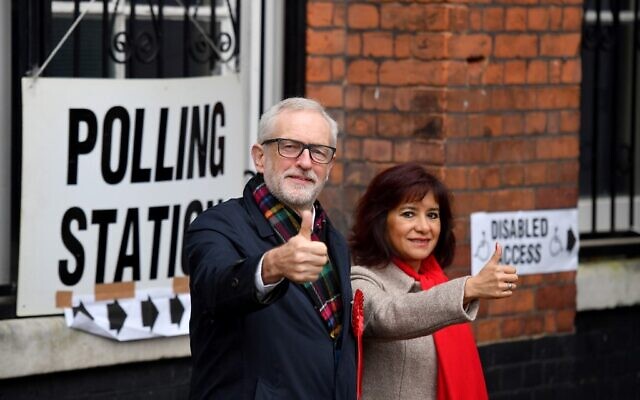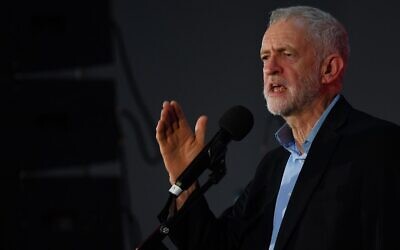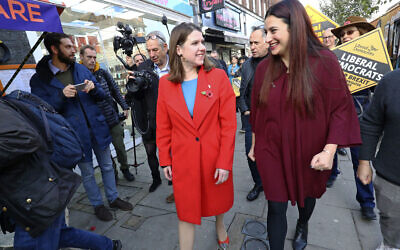Labour leader had inpired fears among Jewish community given inability to deal ith anti-Semitism in party; former mayor Livingstone: The Jewish vote didn’t help

British Jews and others breathed a sigh of relief late Thursday after an exit poll showed an overwhelming defeat for Labour leader Jeremy Corbyn, who had been derided by leaders of the country’s Jewish community for failures to confront anti-Semitism.
An exit poll showed the Boris Johnson led Conservative party trouncing Labour 368 seats to 191 seats, which would represent the worst showing for the party since before World War II. A number of senior Labour officials predicted Corbyn may have to give up the reins of the party, including close ally Jonathan Lansman, the Jewish head of Labour’s Momentum movement.
“The relief among the Jewish community is palpable. And the gratitude.
But as the days and weeks move on, there is something on which we will reflect: the willingness of so many of our so-called allies to campaign for and embrace Jeremy Corbyn,” tweeted Stephen Pollard, editor of the Jewish Chronicle newspaper. He also called the exit poll results “the best possible.”
Many British Jews have said the elections are particularly fateful for them because they believe that the Labour Party has become institutionally anti-Semitic under Corbyn, a pro-Palestinian politician who was elected to lead the party in 2015.
Corbyn has been accused of failing to deal with incidents of anti-Semitism within his party, as well as his reluctance for the party to agree to a definition of anti-Semitism that included some anti-Israel language.
His ties to members of the Hamas and Hezbollah terror groups and photos of him laying a wreath at the grave of a Palestinian terrorist also sparked worries among UK Jews and Israelis, who feared that the Jewish state could lose its close alliance with the UK if Corbyn won.

Likud MK Nir Barkat, a former Jerusalem mayor, praised Johnson for seemingly defeating “the anti-Semitic Corbyn.”
“Knowing you in your role as London mayor, a member of Parliament and prime minister, I have no doubt that you will successfully lead the British nation and strengthen and deepen the UK-Israel partnership,” he wrote on Twitter.
Israeli Labor party MK Itzik Shmuli also celebrated Corbyn failing at the polls. “I would never of imagined I would be so happy about Labour’s defeat,” he tweeted.
Vladimir Sloutsker, president of the Israeli-Jewish Congress, congratulated Johnson on the projected results.
He said he hoped the “politics of divisiveness, hate and antisemitism of Mr. Corbyn and his allies can finally be put to rest.”
Meanwhile former London Mayor Ken Livingstone, a Corbyn backer who was removed from the party for statements deemed anti-Semitic, blamed the Jewish community for the party’s loss.
“The Jewish vote wasn’t very helpful,” he told the Press Association.
Corbyn has pledged not to tolerate racism within Labour but leaders of British Jewry have said he is himself part of the problem. A recent report by the Jewish Labour Movement found he himself had trafficked in anti-Semitism on at least nine occasions.

Some 70 Labour staff contributed to a dossier handed to a human rights watchdog probing the claims. One listed 22 examples of alleged abuse at party meetings.
On one occasion, he said he was told: “Hitler was right.”
After the exit poll results, Mike Katz, the head of the Jewish Labour Movement, blamed the predicted poor results on “the multiple failures of the leader & his team.”
While the party’s predicted loss was blamed on a number of issues, from Brexit to Corbyn’s hard-left positions, some also pointed to the Jewish community’s fears and the party’s inability to deal with anti-Semitism.
“Antisemitism was a problem in London at the beginning of the campaign but in the middle of the campaign it became a problem in the rest of the country,” a senior Labour source told The Guardian. “People didn’t understand why he wouldn’t say sorry for that.”
Margaret Hodge, an MP who had been sanctioned by Labour for speaking out against Corbyn over anti-Semitism, said he was to blame for the failure.
Deliberately misreading the exit poll from McDonnell. If this bears out, this is the utter failure of Corbyn & Corbynism. There is no other way of looking at it.
— Margaret Hodge (@margarethodge) Disyembre 12, 2019
Who could’ve predicted that having no position on greatest issue of our time, allowing Antisemites to run riot, buying into conspiracy theories & endlessly telling potential supporters they were fucking Tories if they dared question cult of Magic Grandpa, could have led to this?
— Sathnam Sanghera (@Sathnam) Disyembre 12, 2019
If this is correct, and it probably is, then Corbyn must go and take ALL the antisemites with him. Toxic and unforgivable. Lib Dems need a solid existential rethink, and ordinary Labour, Lib Dem and Green members need to start talking to each other fast. https://t.co/mOhAISXoFs
— Armando Iannucci (@Aiannucci) Disyembre 12, 2019
The previous chief rabbi of Britain, Jonathan Sacks, last year called Corbyn an “anti-Semite.” The current chief rabbi of Britain, Ephraim Mirvis last month published an op-ed in The Times of London, effectively calling on voters not to vote for Labour over the anti-Semitism issue, saying that Corbyn is “complicit in prejudice.”

There was no immediate comment from either rabbi or the Jewish Board of Deputies umbrella group.
Earlier this month, the Simon Weisenthal Center named Corbyn as the top anti-Semite of 2019.
In Golders Green, a heavily Jewish area of north London, residents spoke of fearing a Corbyn victory.
“You talk to people who are in their 80s and 90s and they were terrified. The words that resonated were, ‘This is how it started in Germany,’” said Mike Freer, the area’s Conservative MP, before the election.
According to exit polls, Freer was set to lose the seat to Jewish former Labour MP Luciana Berger, who quit the party over anti-Semitism to join the Liberal Democrats.
As reported by The Times of Israel
